Overview
Daicel Arbor Biosciences supports your project from start to finish with next-generation sequencing (NGS) on multiple next- and third-generation sequencing platforms. Whether you need a lot or a little data, we can configure a sequencing design that is right for your research goals and budget. Combining our Sequencing service with our Library Preparation, Targeted Sequencing, DNA/RNA Extraction, and Bioinformatics options is a great way to complete your NGS project.
| Any Platform | Supported Configurations |
|---|---|
|
|
Benefits
Tailored to your needs
For short-read sequencing projects, we can prorate partial PE150 flowcells to deliver the optimal amount of data for your project. If you need more reads, we also offer full lane and flowcell options. Already have a sequencing provider? We can send them a sequencing pool of prepared libraries (shotgun or enriched) to meet their specifications.
The latest technology
We are always looking forward to what’s next in the high-throughput sequencing (HTS) world, so keep checking this page as we continue to stay at the forefront of this quick-developing field.
Resources
FAQs
All of Arbor’s library preparation service options are AVITI-compatible.
Please see the library kit compatibility guide from Element Biosciences for a list of kits with which AVITI sequencing is compatible.
Briefly, compared to the figure below, the 5’ and 3’ end of the adapters must not have missing, additional, or mismatched bases or modifications that would block DNA ligation:

Yes! A full AVITI flowcell generates approximately 240Gbp of PE150 data.
If you need more data and need it speedily, the AVITI can run two flowcells simultaneously.
Yes! We can offer AVITI sequencing in units of Gbp, which is ~3.3M PE150 read pairs. The price per Gbp goes down the more Gbp you get!
You’ll receive demultiplexed, but otherwise raw FASTQ files. There will be two files (read 1 and read 2) per sample. If you are familiar with Illumina sequencing output, the data will be identical to the format you are familiar with.
- Decreased sequencing turnaround time. With the sequencer in Arbor’s hands, we’re in full control of the speed and can provide data at least 2 weeks faster than ever before.
- Increased read quality. Runs frequently produce results with >90% of reads meeting or exceeding Q30 quality scores.
- Flexibility. Mid-sized flowcells (~240Gbp) make flowcell-level pricing accessible for smaller project sizes.
- Compatibility. The AVITI is compatible with all of Arbor’s existing short-read library preparation (and capture) options, so you can feel confident knowing that your precious samples will be handled with the protocols you trust.
While the output (FASTQ files) is the same, the sequencing chemistry is different. The AVITI uses “avidity sequencing,” which is a sequencing-by binding chemistry. Illumina sequencing employs a sequencing-by synthesis chemistry. The avidity sequencing chemistry improves the accuracy of the basecalls. Read more about avidity sequencing here.
AVITI is the new short-read medium-throughput sequencing platform from Element Biosciences. It is a drop-in replacement for Illumina sequencers – meaning that it is compatible with Illumina libraries and the data format is the same as you’d get with an Illumina sequencer.
Many sample types and species will require special permits for shipping internationally (or domestically). We can provide some advice, but ultimately you are responsible for proactively identifying the permit(s) that are required for your unique samples. Some examples of biological samples that require permits are tissue or DNA from CITES-listed specimens and plant tissues regulated by the USDA/APHIS.
If Daicel Arbor Biosciences is required to apply for an import permit on your behalf, you will be required to pay a permit application fee, regardless of whether the application is successful.
We strongly encourage our customers to research shipping regulations before contacting us about your project to determine your specific permit needs. Incorrect or incomplete documentation may result in the seizure and loss of your samples at Customs, and potentially the assignment of fines/fees.
Yes. We require documentation that all relevant and necessary ethics approvals have been granted for any human specimens that you would like us to work on. This includes both contemporary and ancient samples and includes both tissue and nucleic acid derivatives. Please contact us to receive our Ethics Statement document if you are interested in sending human samples to us. We do not accept clinical specimens and are not CLIA-certified.
We prepare short-insert libraries with 8-bp unique dual indexes.
We prepare long-insert libraries with 16 bp identical dual indexes.
Upon arrival, we will take a look at your shipment and plastics to ensure that the samples have not been damaged during their journey. At that point, your project will enter our QC queue.
For Standard and Long Insert quality DNA samples, we will quantify the total gDNA with a spectrofluorometric assay, purify up to 80% of the material, and re-quantify the samples. For Degraded quality DNA samples, we will perform the initial total gDNA quantification as well as visualize at minimum a subset of your samples on the Agilent TapeStation platform. For Ancient quality DNA samples, we will perform the initial total gDNA quantification and may visualize a subset of your samples on the Agilent TapeStation platform.
For RNA samples, we will perform a total RNA quantification. If you have ordered our RNA clean-up, we will perform a DNase treatment, a bead-based purification, a visualization via Agilent TapeStation, and a second total RNA quantification.
For pre-made libraries, we will perform a total gDNA quantification as well as a qPCR-based assay for properly adapted Illumina-compatible library molecules.
If you order QC-only services, the “Standard QC” is the same as the Standard DNA quality QC above. The “Extended QC” is the same as the Degraded DNA quality QC.
We will provide a QC report with the results of our QC to you when you send us DNA, RNA, or libraries. We will also perform the appropriate QC and send the QC report for samples for which we perform the DNA/RNA extraction.
Yes. We are able to expedite a select number of projects at a given time. Please inquire if you believe your project needs to be expedited and we will let you know if we have availability in our expedited pipeline and if the desired project timeline is feasible. When a project is expedited, it will skip our regular queue. We do not guarantee a specific turnaround time guarantee for expedited projects. We will do our best to be transparent with anticipated timelines and will communicate progress as well as delays with you during the process.
Yes. Please do your best to provide your project information as accurately as possible and we would be happy to provide a price estimate for you to use in your grant proposal. However, please be aware that our prices may change between when your estimate is provided and when your grant is funded.
Our goal is to provide NGS services for your project as if you were working directly with one of your research collaborators. We strive for a transparent and cooperative approach to NGS projects, and will communicate openly with you to find the right solution for your individual research design needs. We have decades of collective experience in molecular biology, including target capture & high-throughput sequencing, and working with difficult specimens.
In order to facilitate transparent, collaborative projects, we have opted to not offer specific guarantees for target capture & sequencing service projects, since every custom project is completely unique. In science, sometimes research projects do not go 100% according to plan. However, you will only pay for the services that we actually perform. We will give every project our individual attention, and all laboratory work is performed by hand on the bench by our team of dedicated & experienced researchers. We aim to provide you with the very same dedicated laboratory attention that you & your research team would give to your own work. You can be assured that we will communicate openly with you about all aspects of your project, and will not commit to a project before first discussing all the options with you.
We offer a full suite of services for next-generation sequencing projects, on both regular specimens as well as degraded specimens such ancient DNA including:
- Extraction of DNA and RNA from fresh or degraded samples
- Short-insert DNA and RNA library preparation suitable for downstream sequencing with Illumina and similar platforms
- Long-insert DNA library preparation suitable for downstream PacBio and Nanopore platforms
- Target enrichment using myBaits catalog and custom kits
- High-throughput sequencing on Illumina and PacBio instruments
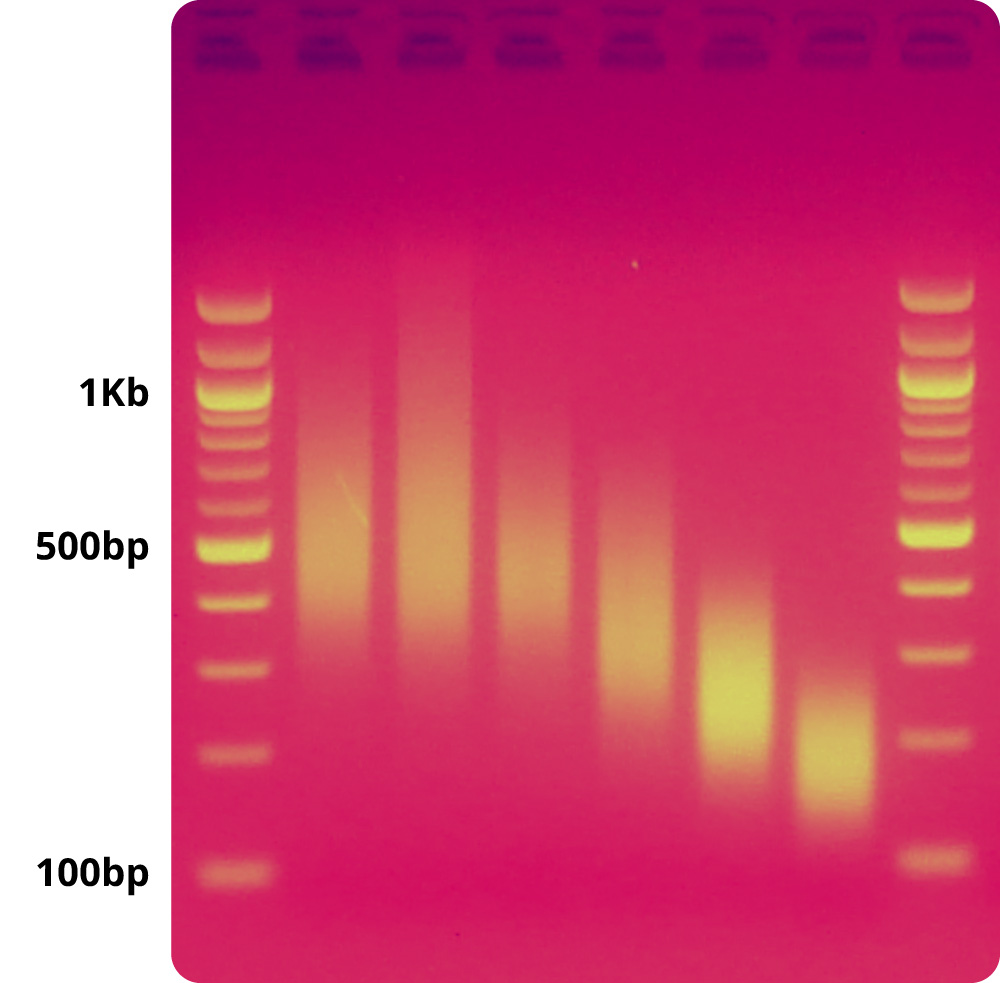
Demonstration of a range of customizable NGS library insert size options available from NGS services team at Daicel Arbor Biosciences. Our experts can help you to choose the best average insert length appropriate for your specific myBaits target capture project, whether SNP resequencing, exon capture, UCE sequencing, or more. Depending on the quality of your DNA, the nature of your desired target regions, and your planned sequencing platform and read protocol, your project may benefit from either shorter or longer NGS library sizes.
Please find the current submission guidelines and sample preparation instructions in the “Resources” section. These guidelines should be sufficient for most standard DNA or RNA extracts derived from fresh, high-quality, relatively recent specimens (e.g. DNA extracted from fresh, frozen, or alcohol-preserved tissues) or for submission of pre-made NGS libraries.
In addition, we are currently accepting most service projects for atypical or sensitive samples, including specimens with degraded or rare targets (e.g., ancient DNA, museum, archival, metagenomic, environmental, etc). However, you should first contact us with more information about your samples & research goals, so that we can determine if we are able to accept your project.
Yes we can, however we caution that there is a higher risk of sample and/or target drop-out for low-input and/or low-quality samples. In our experience across many project types, the recommended amounts outlined in the Sample Preparation Guide provide the best results.
We have outlined specific recommendations for Standard, Degraded, and Ancient DNA handling in our Sample Preparation Guide. We may recommend or request that you change the handling/package type based on the specific quantity/quality of DNA present in your samples if they do not meet the criteria for the handling type that you ordered. If you decide to proceed with a handling/package type that does not align with the quantity/quality of the DNA, you assume the risk that your sample(s) may result in little or no useful data.
We do not have a minimum sample number, but we advise that smaller projects will have a higher per-sample cost than larger projects due to the labor required to process a batch of samples and our volume discount pricing. There is no maximum sample count per project.
Please see our NGS Service Policies PDF document (available under Resources) for more detailed information.
Due to the inherently variable nature of target capture & high-throughput sequencing experiments (especially for new, untested, custom baitsets), we are unable to offer service guarantees related to turnaround time, unique read sequencing coverage depth, on-target percentage, and other experimental outcomes.
In order to facilitate transparent, collaborative projects, we have opted to not offer specific guarantees for service projects, since every custom project is completely unique. In science, sometimes research projects do not go 100% according to plan, and for target capture, it is very difficult to plan for specific sequencing outcomes without prior experimental data. However, you will only pay for the services that we actually perform, and we will not accept a project before discussing all the options with you.
You will receive updates and estimated timelines for completion of different stages of your project. If you are working within a specific deadline, we will certainly make every effort to accommodate that, though we cannot guarantee that it will be possible to finish your project within that window.
We are able to expedite a limited number of projects at any one time, please inquire if you believe your project needs to be expedited. When a project is expedited, it will skip our regular queue. We do not guarantee a specific turnaround time guarantee for expedited projects.
Yes, you can provide libraries that you have made yourself. However, we would prefer that we make the libraries so that we have direct control over the uniformity and quality of the libraries going into target capture.
If you send us libraries, they must be compatible with dual-indexed 8bp index reads, and you must make us aware of any incompatibilities within your sample set before you receive a quote.
Please confer with us to make sure that we are fully aware of the type of libraries that you are using, since it is critical to choose the correct adapter-specific blocking oligos during capture and the right amplification primers after capture.
Yes, we are currently accepting sequencing-only projects on the AVITI platform. Libraries must be compatible with the AVITI platform - see FAQ "What kind of libraries are compatible with AVITI?" for more details.
Yes. We typically have enough material to perform multiple different types of captures from a single set of libraries that we generate. Depending on your specific bait set and sample configuration, it may be possible to pool more than one different bait design in a single capture reaction. Please contact us for more information about pricing for your individual project configuration needs.
We offer NGS services on non-hazardous DNA or RNA extracts, whether from high-quality or degraded specimens. However, your samples should still meet our standard submission requirements for your type of service project, including relevant negative controls where applicable. Otherwise, your samples may be unable to pass our quality controls, or your project could be delayed. Please review the guideline documents in the Resources section.
Please note that if you are shipping your samples internationally which require any sort of import permit, you are responsible for identifying the permit and will incur a fee for any permit applications. Additionally, we require proof of ethics clearance for working with any human or human-derived samples.


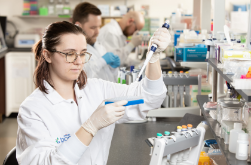
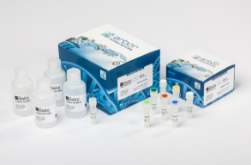
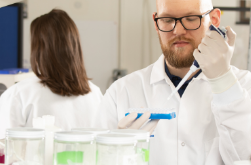
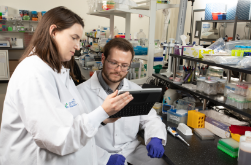

 Bluesky
Bluesky